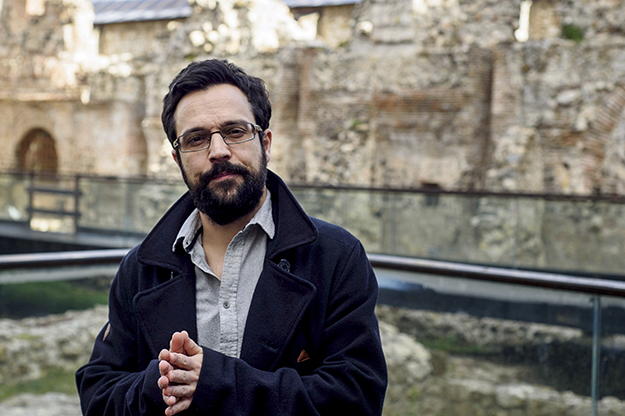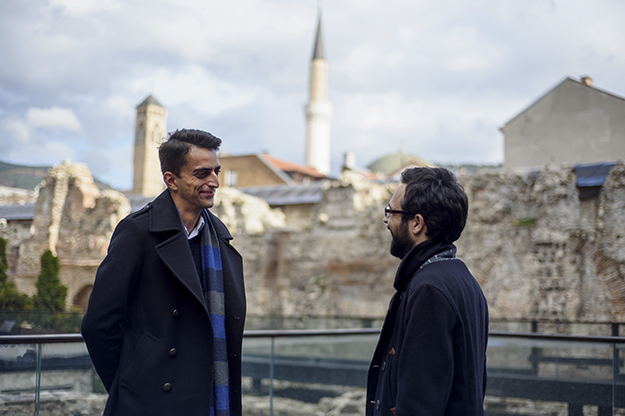Igor Stiks is a writer and scholar from Sarajevo. He grew up in Zagreb, now lives in Belgrade, and has spent parts of his life in Paris, Chicago and Edinburgh.
His multiple award-winning 2006 novel “The Judgement of Richard Richter” was translated into 15 languages, and became an Amazon bestseller in the United States. In 2014, he was declared a Knight by the French Order of Arts and Letters. Recently, his second novel, “Rezaliste,” was published, in which he deals with the politics of identity, a topic that he is so familiar with through his own biography.
K2.0 spoke with Igor Stiks in Sarajevo, after the sixth Open University, an open platform for critical thought, free exchange of knowledge and experience, and the promotion of high quality academic productions, of which he is one of the founders. This year’s program was held under the slogan “What can be done?”
In addition to this question, K2.0 spoke with Stiks about the problems of the growing extreme Right, the impossibility of an organized, unified response from the Left, young people leaving the region, “acceptable” and “unacceptable” migrants in Europe, and the marginal role of Balkan states within the neoliberal capitalist system that rules the world.
K2:0: This year marks the hundredth anniversary of the October Revolution. What do these 100 years represent? What does the October Revolution of 1917 mean to us today?
Igor Stiks: The ambivalence towards the 100th anniversary of the October Revolution rests in the state in which we find ourselves today. We all feel that something must be done with today’s world, but we aren’t that certain that we need that kind of revolution.
On the one side, on the “left coast,” there is a fascination with what the Bolsheviks — and many other revolutionary Communists after them — did back then, because of the fact that it was possible to use one collective action to truly change the world, which couldn’t be the same again after the October Revolution.

Photo: Jim Marshall.
On the other hand, our ambivalence towards these events, especially with regards to what these revolutions include, meaning oppression, terror, or what we see today as results of a revolution which certainly were not predetermined, such as, for example, Stalinism — these also influence the perception of our possibilities, as well as the ethics which we want to insert into our actions. It means that we want to change the world in a non-violent manner. Is that possible?
I thought of asking you that: Is any kind of revolution possible today?
Well, it is known that right before the February Revolution, Lenin was a desperate man in Zurich, who went to the library every day and thought he would never see the revolution happen in his lifetime. I think that Trotsky was in New York back then. Then things started to develop in a completely unbelievable way, and influenced everyone to take action and bring about something completely new.
The second episode happened when Lenin came to Saint Petersburg, where after his speech at the Finland station, in a narrow circle with other Bolsheviks, he spoke of his strategy, which opposed everything they had advocated for until then. Instead of reforms through constitutions, constitutional assemblies, the spreading of workers’ rights, the right to vote, Lenin suggests decisive action: the overthrow of the government, the disbanding of the state and forming some kind of direct democratic bodies that would take over.
This truly anarchistic vision confused many Bolsheviks but it seems that Lenin was one of those who saw that such a radical vision would be necessary for the revolution to succeed. We haven’t experienced such an anarchistic revolution in this sense, but it is true that such radical belief in that moment really opened up a new horizon.
The problem is that they actually managed to do it. Many other revolutionaries failed. The conclusion would be that it is difficult to predict what a revolution would look like today. It is more difficult to find it a proper form. However, many people will say, alright, perhaps the conversation about a revolution is even limiting within itself. Let’s try to see which micro-changes are possible — changes that are really accessible to us, and which don’t demand for the entire world to change. I think that the right solution is to reflect on these radical forms of revolution, and to simultaneously act in those places where action is really possible.
It also seems that the system became a lot more cunning in the meantime. On the other hand, we had demonstrations in Poland a few days ago, where a huge number of ultra right-wingers — some would say, fascists — gathered in the streets. Fascism, some would again say, is appearing once more. In what kind of an environment do we live in and how does the world today influence our lives?
Today we all know that there is no single place of power, there is no Winter Castle to be conquered in order for the revolution to occur. But actually the question is where should this revolution happen, and we don't know where.
It’s interesting that the system we are up against, that we call neoliberal capitalism, has developed sophisticated forms of management. Today we all know that there is no single place of power, there is no Winter Castle to be conquered in order for the revolution to occur. But actually the question is where should this revolution happen, and we don’t know where.
We find out that most of the money that exists in the world is not stored anywhere, but registered on some islands. On the other side, we see that the system is clashing with us, with all kinds of subversive elements, old methods. Fascist methods. Hence, such a sophisticated system still needs thugs, those who will go out in the street and beat up students, workers, anyone who demands change.
We saw this recently in Zagreb, when the October Revolution was celebrated in a performance-like manner by hanging a red flag on the Faculty of Philosophy building. On the same night, ten masked, armed people came and beat up the students. This is the picture: on the one hand, we have the Paradise Papers and on the other we have this brutal force that has always been the same, desperate people that the system uses to protect itself, and simultaneously find sophisticated methods to hide its power.
The biggest issue of our region currently is that many people want to leave. I assume that this is the result of the system’s influence, especially in the peripheral areas. Why do people want to leave? What does their wanting to leave mean? How do we stop them from going and should we do that?
A little bit of old Marxist analysis would allow us to clear up the situation. It would not necessarily offer us a solution, but it would help us really see what is going on.
Yes, we are peripheral societies that have young, highly educated populations, that have certain skills to offer to the capitalist West, skills the West actually needs. These skills don’t bring about economic or social satisfaction, like a job or some vision of the future in their domicile environment. Hence, people leaving isn’t surprising at all.
There are also those people who are needed to be waiters and to clean toilets, and they still come from Europe, and they still have a certain degree of education and cultural elasticity that responds to Western societies. They become immigrants who are an acceptable opposite to those who we don’t want to have, who come from Asia, Africa, and especially those of Muslim descent.
So, this racism has now become very layered. Hence, very strangely, we see a coalition of the Serbian diaspora and the Austrian neo-fascists who support each other. It is clear from this that the Serbian diaspora is closer to the Austrian fascists than the Syrian or any other diaspora.

Photo: Jim Marshall.
Also, we must take into consideration that the right itself is changing. Right now we are being introduced to a whole new hipster-Right, where the so called ‘identitarian generation’ in France, Austria, Germany is emerging, that is completely reactionary, but is hipster-like: with nice beards and relatively sophisticated speech, but the message of which is very clear. “There are those who don’t share our values, who don’t belong in our society.”
These people [who don’t belong] are immigrants, these people are those whose skin color is different. These people are also those — and here we reach the inevitable conflict — on the Left that think that societies must change, must open up, etc. So, the Fascist impact hits, as always, two sides: minorities and the Left, [both] seen as a threat to the system of certain traditional cultural values.
It seems that identity plays a key role in the whole story. The current identity system no longer seems functional. You deal with this issue in your newest book, “Rezaliste.”
Now we see the consequences of identity politics that, of course, emerged in the West at the same moment when the possibility of revolutionary change of those societies halted. A large portion of the Left was involved in the identity politics struggle, in the struggle for recognition. Many of them were justified: the struggle for the recognition of women’s rights, the right to sexual orientation, rights of minorities to express and protect their identity.
But, the perversion of identity politics led us to this, almost racist situation in which we close up people in their identities. Where, on the other side of the fragmented Left, struggles were brought down to the protection of its own identity, and not on certain solidarity struggles that would say: ‘Alright, fine, let’s admit the injustice that societies bring upon vulnerable groups, but our horizon must be broader.’ This is the difference between liberals and socialists.
Human rights can't really help you if you don't have anything to live from.
Human rights are not sufficient if societies don’t change. If those aren’t societies of true social and economic equality. In that sense, human rights can’t really help you if you don’t have anything to live from.
One of the ways of dulling the revolutionary blade was through identity politics. It gave a tremendous thrust to the right-wing forces, because the story of hard identities that are threatened is essentially a right-wing, reactionary story. They managed to use it to their advantage to the fullest, while we simultaneously lost our vision of changing society. We accepted that change isn’t possible and that it is only possible to make our societies better.
Today, even these masks have fallen. Not even this is possible. Societies won’t become better. Unfortunately, the capitalism we live in smashes those societies and creates unbelievable conflict on a global level, and now we look at that horrible situation that is developing in front of our eyes, but we are still passive. We don’t have a way, because we don’t know the answer to the question: ‘What can be done?’
We have already mentioned 2017. From my conversations with other people, I was of the impression that 2017, just like last year, is something of an indicator that something is completely wrong with our universe. What do you think we can expect in the following years?
At the risk of predicting future events — and we can predict only with the elements we have now — if things stay the same, it is completely clear that crises and wars will intensify. We are already living a global war. It changes its geographical locations, but we are all involved in it, and are directly affected by it. The war in Syria affected us all, and not only through the wave of refugees, but it generally affects us all.
These wars will intensify, because it is clear that capitalism cannot offer a solution. The response to the crisis from 2008, we may say, was a response with even more neoliberalism and with the development of the system of repressing resistance.
That’s why we have seen the failure of the Occupy movement, the failure of all such movements that clearly said “no” to that system. If the ruling people don’t have a vision of how to change things and can’t change their system, then the only thing they can do is strengthen repressive instruments. This will create a whole new series of conflicts at the very center of capitalism.
On the periphery, this new kind of destruction of the socio-economic basis of these societies will continue, with people leaving, with the impossibility for the largest number of people to have dignified lives, with the creation of one elite that will live in closed communities, and with the exploitation of natural resources on behalf of international concerns.
There are people on the Left who invoke absolute disaster in order to bring about change after this disaster. I understand that, but it would be nice for it not to be that disastrous.
In the Balkans, we have a particular situation, because the struggle for national states truly experienced its full perversion. They destroyed societies and nations for which they said they fought for, those who don’t have any independence and sovereignty.
This isn’t only true about the countries that are some kind of protectorates, like Bosnia and Herzegovina and Kosovo, but, let’s point out the example of Croatia and the crisis surrounding Agrokor, which confirms that the Croatian government is obviously just some administrative unit that should keep society in check while decisions are really being made somewhere else. These are caricature countries where nothing is comic, but actually tragic.
So I expect that all possible conflicts that we are now witnessing will intensify, that the response to them will be that of the radical Right; so, precisely this type of closing into a community, and conflict with other communities in the areas we live, but that this will also lead to the possibility of radical change.
Now, the perspective of such a possibility lies in us. There are people on the Left who invoke absolute disaster in order to bring about change after this disaster. I understand that, but it would be nice for it not to be that disastrous, that is, that the possibility of change only opens up once the system crushes fully.
Yes, there is this whole idea of “it must get worse to get better.”
Let’s hope that there won’t be a situation in which where something like a new world war would happen, that would then enable and open up space for a social revolution. But of course, you could justly ask me how in a system like this one can we make any substantial change. It is offered to us — which is an offer we must take, because it is the only ground [given] — to change certain practices through becoming involved in existing institutions. That is how, now, the Left has moved on to municipal battles.
In a sense, we have given up on the state, because we can’t “conquer” it, we can’t have it, and we engaged in city battles as a possibility to have the change — because the financial, social, and cultural capital is centered there, in the cities. [We have tried] to somehow subversively affect city institutions, with which people can identify themselves, and to subvert this state, and transnational power. K
Feature image: Jim Marshall.



